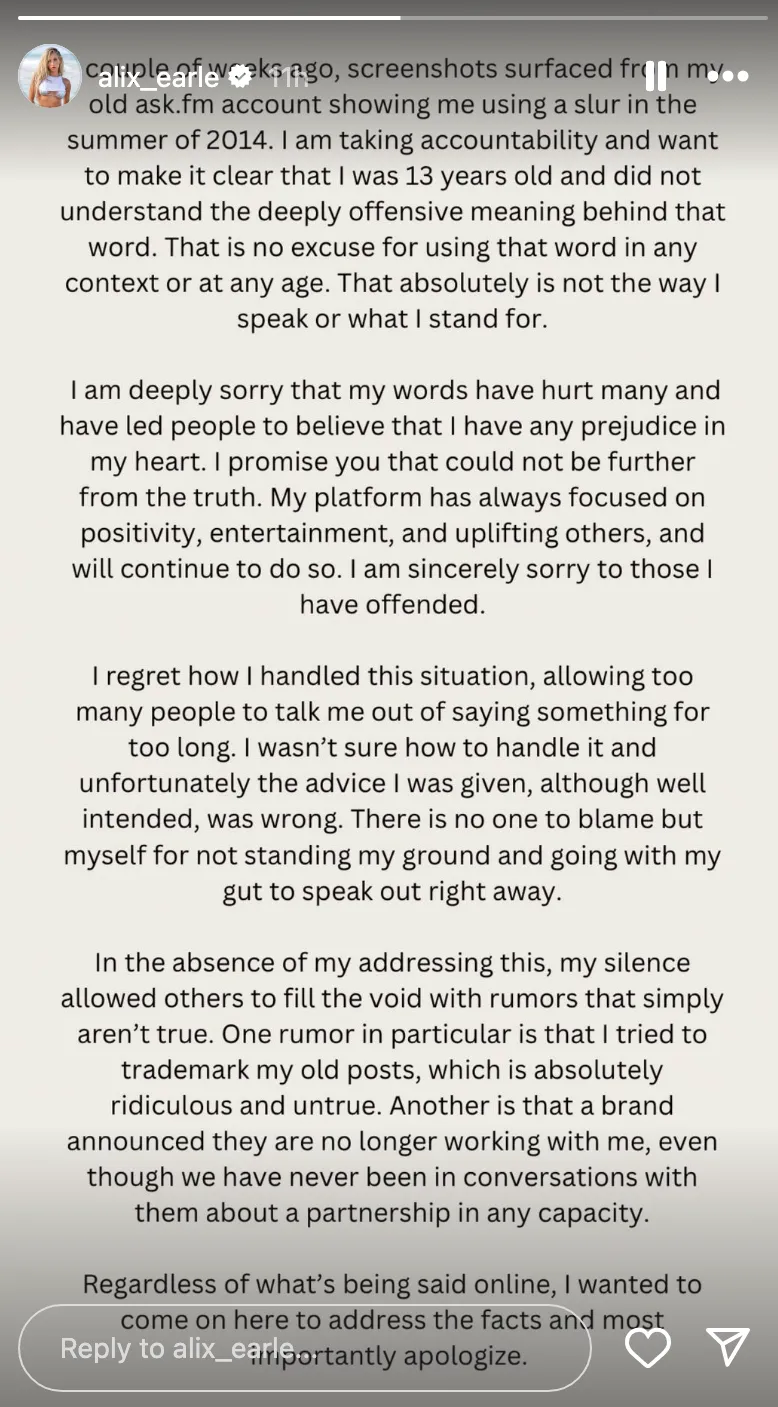

In the age of social media, where past actions can resurface with the click of a button, the online presence of influencers is often scrutinized under a powerful microscope. Alix Earle, a prominent TikTok personality with millions of followers, recently found herself at the center of a controversy that highlights the enduring consequences of one’s digital footprint.
Table of Contents
The controversy began in early August 2024, when screenshots of Alix Earle’s old posts from the social platform ASKfm resurfaced on Reddit. In these posts, made when Earle was just 13 years old, she repeatedly used the N-word, a racial slur with deep-rooted offensive connotations. The posts, which had initially appeared online several years ago, gained renewed attention as they were circulated widely across various social media platforms, igniting a wave of backlash against the influencer.
Earle, who boasts over seven million followers on TikTok and nearly four million on Instagram, initially remained silent as the controversy unfolded. However, as the online chatter grew louder, and the pressure to address the situation mounted, she eventually broke her silence on August 26, 2024.


Taking to her Instagram Stories, Alix Earle issued a formal apology, acknowledging the use of the racial slur in her past posts and expressing deep regret for her actions. “A couple of weeks ago, screenshots surfaced from my old ASKfm account showing me using a slur in the summer of 2014,” she began, adding, “I am taking accountability and want to make it clear that I was 13 years old and did not understand the deeply offensive meaning behind that word. That is no excuse for using that word in any context or at any age. That absolutely is not the way I speak or what I stand for”.
Earle emphasized that she is deeply sorry for the hurt her words have caused and made it clear that her past actions do not reflect her current beliefs. “My platform has always focused on positivity, entertainment, and uplifting others, and will continue to do so. I am sincerely sorry to those I have offended,” she continued, addressing her vast audience.
The apology was met with mixed reactions. While some followers appreciated her taking responsibility and addressing the issue head-on, others criticized the delay in her response. Earle herself admitted that she had mishandled the situation by not speaking out sooner. “I regret how I handled the situation, allowing too many people to talk me out of saying something for too long. I wasn’t sure how to handle it and unfortunately the advice I was given, although well-intended, was wrong,” she said.
Earle’s case is a stark reminder of how past actions on the internet can have lasting consequences. The fact that the posts resurfaced years later and created a significant backlash illustrates the permanence of online content. It also highlights the importance of educating young people about the potential repercussions of their online behavior.
In her apology, Earle also addressed various rumors that had surfaced alongside the controversy. Among these was a claim that she had attempted to trademark her old posts, a rumor she categorically denied. “One rumor in particular is that I tried to trademark my old posts, which is absolutely ridiculous and untrue,” she stated. Another rumor suggested that a brand had severed ties with her in light of the offensive posts, which she also denied, clarifying that no such partnership discussions had ever taken place.
The incident has sparked broader discussions about accountability, cancel culture, and the process of public apologies in the age of social media. While some argue that people, especially those as young as Earle was when she made the posts, should be given the opportunity to grow and learn from their mistakes, others believe that such actions should not be easily forgiven, particularly when they involve deeply offensive language.
The mixed response to Earle’s apology reflects the complexity of these issues. On one hand, there is an understanding that people can change and that youthful ignorance should not necessarily define a person’s entire life. On the other hand, there is a strong sentiment that public figures, especially those with large followings, must be held to a higher standard of accountability.
Alix Earle’s apology for her past use of racial slurs is a significant moment in her career as an influencer. While she has expressed sincere regret and a commitment to promoting positivity, the controversy serves as a reminder of the lasting impact of one’s digital footprint. The mixed reactions to her apology also underscore the ongoing debates around accountability, forgiveness, and the role of social media in shaping public discourse.
As the story continues to unfold, it will be interesting to see how Earle navigates her platform in the aftermath of this controversy and whether her audience will accept her apology or continue to hold her accountable for her past actions. Regardless, this incident is a clear example of the importance of mindful online behavior and the potential consequences that can arise from even the most distant digital past.
Mother's Day is the day to celebrate the amazing mothers who raised us and took…
Soap nails have been the most trending manicure style of 2025, and it has thrilled…
Ah, prom season—the one marked by sparkling gowns, immaculate tuxes, lifelong memories. But one major…
Acne can be one of the most infuriating skin issues to work with. Whether it's…
The second weekend of Coachella 2025 was a full-fledged fashion extravaganza, with celebrities descending upon…
In a very sad moment for the world and for the Catholic Church, Pope Francis…